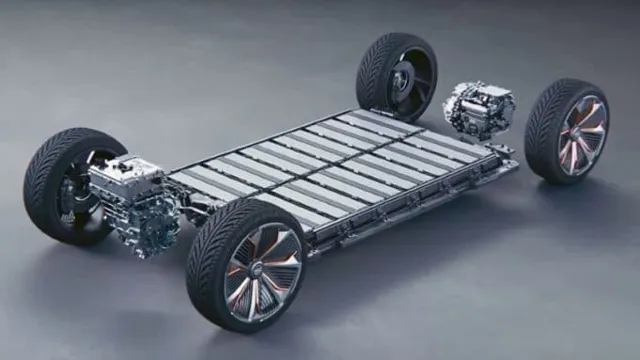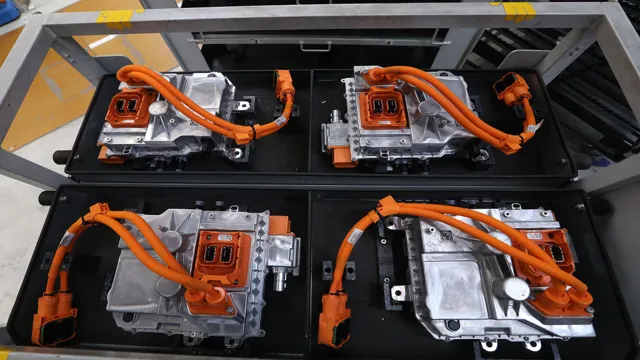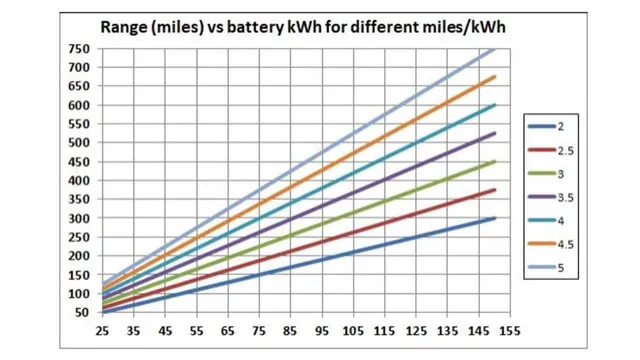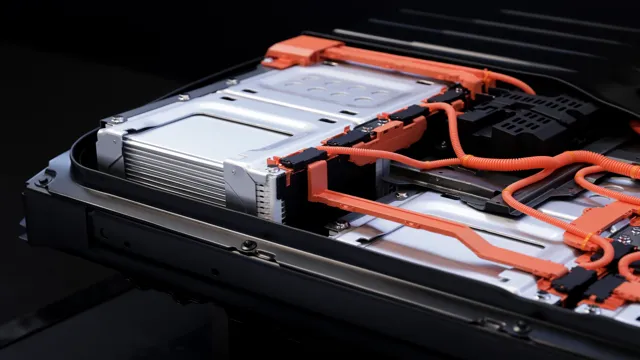The Science Behind Electric Car Battery: Understanding the Power behind Green Commuting
Have you ever wondered how electric car batteries actually work? While the concept of electric vehicles has been around for quite some time, it wasn’t until recent years that this technology truly began to catch on. As businesses and individuals alike look for ways to reduce their carbon footprint, electric cars have become increasingly popular. But what makes the batteries in these vehicles so special? In this blog, we’ll explore the science behind electric car batteries and explain how they are able to power these revolutionary vehicles.
Get ready to go electric!
What is an Electric Car Battery?
Electric car battery science involves understanding the complex process that powers these vehicles. Unlike conventional cars that rely on gasoline, electric cars require a powerful battery to store and convert energy. These batteries are made up of multiple cells that work together to produce the electricity that drives the motor.
The cells are interconnected and packed tightly in the battery pack, which is then installed in the car. Each cell contains two electrodes, a positive and negative, immersed in an electrolyte solution. When the battery is charged, electrons flow from the positive electrode to the negative electrode creating a potential difference.
As the car is driven, the electrons are released from the negative electrode and travel through a circuit to the motor, where they power the wheels. Understanding the chemistry and physics involved in this process is what makes electric car batteries so unique and fascinating.
Composition of an Electric Car Battery
An electric car battery is essentially the heart and soul of an electric vehicle. It stores the electrical energy required to power the car’s motor and enables the vehicle to run emissions-free. The composition of an electric car battery is usually made up of many smaller battery cells that are linked together.
These cells are commonly lithium-ion batteries, which are well known for their efficiency, durability, and high energy density. They work by using an electrolyte solution to move ions between two electrodes, creating a flow of electrical energy in the process. The battery pack also includes a management system that monitors and regulates the flow of electricity to ensure the battery’s safety and longevity.
Given the importance of an electric car battery, it is not surprising that manufacturers are constantly working to improve their design, performance, and cost-effectiveness. The successful development of more efficient and cheaper batteries is significant not only for the future of electric cars but for the environment as well.
How Do Electric Car Batteries Work?
Electric car batteries play a vital role in electric vehicles, providing power to the motor for propulsion. These batteries are rechargeable and made up of lithium-ion cells. Unlike traditional gasoline vehicles where fuel is burnt to create energy, electric cars use a different technique of stored energy in batteries.
When the driver presses down on the accelerator pedal, the electric motor consumes energy from the battery, converting it into electricity, and releases it through the gears to the wheels, propelling the vehicle forward. The batteries are also responsible for supplying power to the car’s accessories and electronics. Essentially, electric car batteries are the fuel tanks of electric vehicles, and they require diligent care to maintain their power and longevity.
Types of Electric Car Batteries
When it comes to electric car battery science, there are several types of batteries used in these vehicles. The most common type of battery is the lithium-ion battery, which is highly efficient and has a high energy density, making it perfect for electric cars. Sodium-based batteries are also being developed as an alternative to lithium-ion batteries.
These batteries have a lower cost and are more environmentally friendly compared to traditional lithium-ion batteries. Another type of battery commonly used in electric cars is the nickel-metal hydride battery, which has a lower energy density than lithium-ion batteries but is less expensive. Finally, solid-state batteries are gaining popularity as they have the potential to be longer-lasting and safer than the other types of batteries.
With advances in electric car battery technology, it’s likely that we’ll continue to see new and innovative battery types for these vehicles.
Lead-Acid Batteries
Lead-Acid Batteries When it comes to electric cars, batteries are the primary source of power. There are several types of electric car batteries, each with its own advantages and disadvantages. One of the most common types of electric car batteries is the lead-acid battery.
These batteries have been used for decades in traditional gasoline-powered vehicles, and they continue to be a popular choice for electric cars. Lead-acid batteries are reliable, durable, and relatively inexpensive. They are also widely available and can be found at most auto parts stores.
However, lead-acid batteries are heavy and can take a long time to charge. They also have a limited lifespan and must be replaced periodically. Overall, lead-acid batteries are a popular choice for electric cars that are used for short distances or in urban environments where there are plenty of charging options available.
Lithium-Ion Batteries
Lithium-ion batteries are quickly becoming the standard for electric cars. These batteries are rechargeable and provide a high level of energy density, meaning they can store a lot of power in a smaller package. There are several variations of lithium-ion batteries used in electric cars, including nickel-cobalt-aluminum (NCA), nickel-manganese-cobalt (NMC), and lithium-iron-phosphate (LFP).
NCA batteries are commonly used by Tesla, while NMC batteries are used by many other manufacturers. Meanwhile, LFP batteries are often used in Chinese electric cars. Each type of lithium-ion battery has its own advantages and disadvantages.
For example, NCA batteries have a high energy density, but they are also more expensive and have less cycle life than other types of batteries. On the other hand, LFP batteries are cheaper and have a longer cycle life but are less energy-dense. When choosing an electric car, it’s important to consider the type of lithium-ion battery used and how it might impact the car’s performance and cost.
Solid-State Batteries
When it comes to electric car batteries, there are several types to choose from. One type that is gaining attention is the solid-state battery. Unlike traditional lithium-ion batteries, which use a liquid electrolyte to conduct electricity, solid-state batteries use a solid electrolyte.
This type of battery has several advantages over traditional batteries, including increased energy density and safety. Solid-state batteries can also be charged more quickly and are less likely to overheat or catch fire. As a result, many carmakers are investing in solid-state battery technology and working to bring it to market.
While there are still hurdles to overcome, such as cost and scalability, the future looks bright for solid-state batteries. Who knows, maybe in a few years, we’ll all be driving cars powered by this exciting new technology.
Battery Life and Charging
Electric car battery science is a fascinating and complex field of study. One important factor to consider is the battery life and charging process. Electric car batteries, like any other rechargeable battery, have a finite lifespan, which can be affected by factors such as temperature, usage patterns, and charging habits.
To maximize battery life, it is recommended to avoid frequent deep discharges and to charge the battery regularly. It is also important to use the proper charging infrastructure and avoid exposing the battery to extreme temperatures. Furthermore, the charging process itself can impact battery life.
Fast charging, while convenient, can be detrimental to battery health over time. Thus, it is recommended to balance fast charging with slower, more gradual charging for optimal battery life. By understanding the science behind electric car batteries, drivers can take steps to maximize their battery lifespan and ensure a better driving experience in the long run.
Factors Affecting Battery Life
There are several factors that can affect the battery life and charging experience of your electronic devices. One of the most important factors is the type of battery used in your device. Lithium-ion batteries are known for their durability and long battery life, while nickel-cadmium batteries tend to lose their capacity over time.
Another factor is the charging method you use. Fast charging technologies may seem convenient, but they can also reduce the lifespan of your battery. It’s important to use chargers that are recommended by the manufacturer to ensure a safe and efficient charging process.
Additionally, the temperature can also impact your battery life. High temperatures can cause the battery to degrade faster, while low temperatures can reduce the battery’s capacity. Overall, being mindful of these factors can help you extend the life of your battery and keep your devices running smoothly.
Charging Electric Car Batteries
Charging electric car batteries is a crucial aspect of owning an electric vehicle. One of the primary concerns for most electric car owners is battery life. This is because the battery is the heart of the electric car, providing it with the power it needs to run.
To ensure that the battery lasts as long as possible, it’s essential to charge it correctly. Overcharging can damage the battery, while undercharging can lead to a shorter lifespan. Therefore, it’s important to charge the battery to the appropriate level regularly.
Experts recommend charging the battery up to 80% of its total capacity to improve its overall lifespan. Modern electric vehicles come with various charging options, including home charging, public charging, and fast charging. Each of these options has its benefits and drawbacks, but it’s essential to choose the one that works best for you.
So, if you want to keep your electric car battery working efficiently and effectively, make sure you are charging it to the appropriate level and using the right charging options.
Future of Electric Car Batteries
Electric car battery science is constantly evolving, and the future of these batteries looks promising. Researchers are working hard to improve energy density, charging speeds, and overall durability of these batteries. In addition, breakthroughs in solid-state batteries are all the rage in the industry, as they promise to offer higher energy density than current lithium-ion batteries.
Another development in electric car batteries is the use of recycled materials in their production to reduce environmental impact. With these advancements, it won’t be long before electric cars become a more mainstream alternative to gas-powered vehicles. The future of electric car batteries is looking bright and will likely contribute to the sustainable transit revolution.
Conclusion
In conclusion, the science behind electric car batteries is a powerful blend of chemistry and physics. The development of battery technology has brought us closer to a sustainable future, and electric cars are no longer a mere concept, but a reality on our roads. The intricate science at the heart of these batteries has enabled us to harness energy more efficiently, meaning we can travel longer distances without sacrificing power.
It’s truly an electrifying time for the automotive industry, full of exciting possibilities and new discoveries. With the future looking bright, all we can say is let’s charge forward and enjoy the ride!”
FAQs
What is an electric car battery made of?
An electric car battery is commonly made of lithium-ion cells.
How does an electric car battery work?
An electric car battery works by converting stored chemical energy into electrical energy to power the car’s electric motor.
What is the lifespan of an electric car battery?
The lifespan of an electric car battery can vary depending on factors such as usage, temperature, and quality, but they are typically designed to last for several years.
How does science contribute to the development of electric car batteries?
Science plays a crucial role in the development of electric car batteries by researching and developing new materials and technologies to improve battery performance, energy density, and safety.





